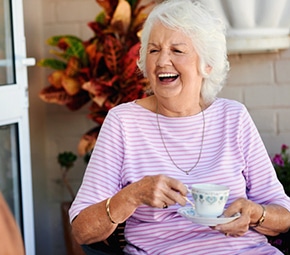Many people find it difficult to communicate with a person with dementia or memory problems. The good news is that the methods to communicate with them are easily learned and can make your caregiving journey a much less difficult and stressful one.
Here are ten tips for better communication, among which some ideas regarding activities for memory care residents:
First, set a positive mood.
Your nonverbal communication, meaning your attitude and body language, can communicate your feelings and thoughts much stronger than any words ever could. Set a good mood for your conversation by speaking to your loves one in a respectful and pleasant manner. Your tone of voice, positive mood, and physical touch can help reinforce and convey your message while showing that you care.
Get the attention of your loved one.
Limit distractions and noise when having a conversation. Address him or her by their name and identify yourself by your name. Use nonverbal cues and physical touch to help them stay focused and involved in the conversation. Stay on their level and maintain eye contact.
Clearly state your message.
While speaking to your loved one, speak slowly in a reassuring tone and distinctly use simple words and sentences. Be sure not to raise your voice even if you get frustrated with the conversation. If he or she doesn’t understand the first time you say something, repeat your message using the same wording. Instead of using pronouns or abbreviations, it is best to use the specific names of people and places.
Ask simple, answerable questions.
Be sure to only ask a single question at a time. Yes or no questions work best with people who have memory issues. Using specific words helps make things simple, clear, and easy to understand.
Give direct and simplistic instructions.
Break down tasks into individual steps to simplify things. Use visual clues and instructions as well to make sure that he or she understands.
Create realistic expectations.
Respond with reassurance and affection, and do not use the word “remember.” It is best not to try and test their memory or tell them of their deficits. A physical reminder, such as holding hands or touching, can help get them to respond if they fail to do so.
If things get tough, distract and redirect the conversation.
People with dementia pick up on body language, so be sure to be warm and open when redirecting. This will reduce stress levels and tension. By redirecting the conversation, you may be able to avoid or delay inappropriate behaviors or delay outbursts.
Try validation therapy.
Validation therapy is based on the idea that a person with dementia may be sorting through past issues somewhat disguised as the present. When having a conversation, try and understand what could be motivating your loved one to act in a certain way. Try and find the trigger or underlying concern, then figure out how to address it.
Use humor to diffuse tension.
Many times laughter can diffuse tense situations almost immediately. Even though their memory is diminished, people with dementia tend to retain their social skills and will enjoy laughing right along with you.
Get support from others.
The most important thing to remember is that you are not alone in this. There are many others who are helping to care for your loved ones as well. You must expect that there will be both good and bad days, and that sharing your experience with others can be very comforting.
If you would like more information about assisted living, contact Angels Senior Living at 877.480.2244 to discuss our services and memory care options.






